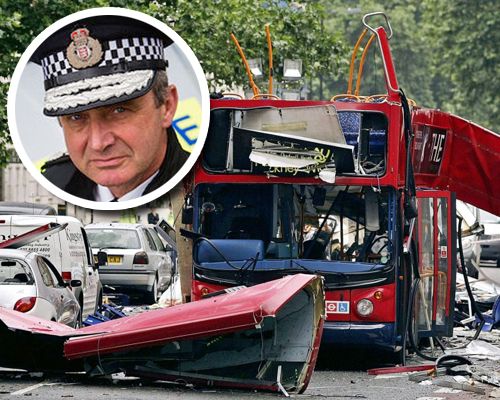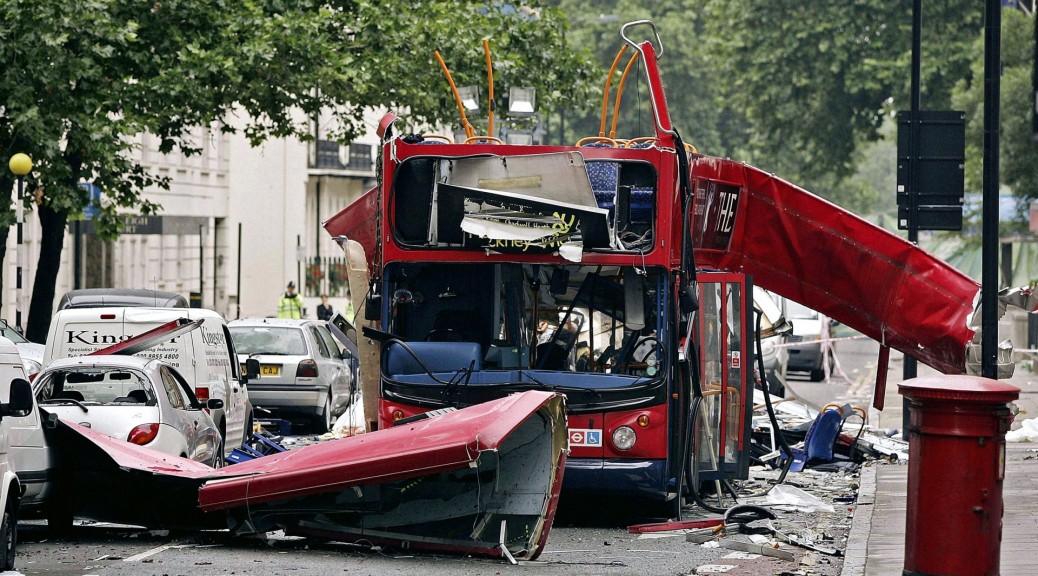

Ten years after helping to lead the response to the 7/7 bombings in London, Jersey’s Police Chief Mike Bowron has told of the shock and devastation that he and his officers faced.
Yesterday marked the tenth anniversary of the bombings that claimed the lives of 52 people and injured around 700. Four terrorists aged between 18 and 30 – all linked to al-Qaeda – blew up tube trains and a bus in the first suicide bombings ever to take place in western Europe.
In his role as Deputy Commissioner of the City of London Police responsible for operation matters, Mr Bowron was thrust into the middle of the emergency response to the attacks as London and the world struggled to come to terms with the impact and implications of the attacks.
And he described the scene as in the wake of the bombings, he went on to one of the tube carriages that had been blown up by a suicide bomber.
“You don’t go immediately as the Commissioner, but ten years ago yesterday I went down to the scene, and saw bloody bandages, ambulance equipment, lots of blood and debris and the whole aftermath,” said Mr Bowron.
“I spoke to officers who were on evidence recovery at Russell Square. That was the worst scene because it was the tightest and deepest tunnel, so it was the hottest – and bear in mind it was July. The heat was intense, there was no ventilation.
“We had to be sensitive about what was a ‘body part’, and what was forensic evidence in the pitch black, when you’re looking for tiny body parts. I get claustrophobic and the thought of doing that for a 12-hour shift… it’s horrendous but it had to be done.
“The pressure is to contain the scene, to make precise what is imprecise, to find out who, why, when and how. You have got to imagine we had this catastrophic scene, the bomber was in a thousand pieces and then you are under pressure to get the system going, to forensically examine four exceedingly complex scenes, to set up a massive mortuary which covered the space of two football fields and a rugby field.
“A huge pre-fabricated mortuary was set up, this enormous thing, it was awe-inspiring.
“Then you have got to get the people to staff it. I had a huge economic crime department – and 28 of my department had been trained as mortuary attendants or in body identification. They went from being fraud experts to putting on white wellingtons and white suits and then putting together pieces of bodies.
It was not just the immediate event and the trauma, it was the aftermath, and getting the evidence right and helping victims and reassuring people.”

Mr Bowron went on to serve as Commissioner of the City of London Police from 2006 to 2011, before coming to Jersey as Chief Officer of the States of Jersey Police.
In the years since he has been here, the force has had remarkable success - crime has dropped to record low levels not seen since the early 1990s. Last year’s 3% drop came after a series of reductions, and crime levels are now half what they were a decade ago.
The stats for last year show that 3,192 crimes were recorded, less than half of the 6,640 crimes recorded in 2004.
Recalling the events of 7 July 2005 and those first few hours as it became clear that London was under sustained attack by terrorists for the first time, he said: “The biggest issue was communications, because hundreds of thousands of people connected with all four incidents were trying to phone others, which completely blocked up the network, and with a very short space of time the network had just gone down.
“One of my Superintendents over-rode it – it was quite secret at the time – he over-rode the mobile systems so that only emergency phones could get on to the system.
“The biggest pressure was to make precise things that were imprecise, and to account for potential victims.

“The next morning I was asked to front up the media, so I was live on the BBC and CNN with a message to inspire confidence globally in London as a place to do business and not to be afraid, and to come on in to work. And that was without the knowledge that four weeks later there would be another series of attempted bombings, when more bombers tried to do the same thing but their bombs didn’t detonate.
“The single biggest pressure was going live on TV and reassuring people. You know that quite important people like the PM and your mum are watching, and you are there to reassure people that the City is open for business, so come to work, a bit of British spirit and all of that. And at the back of your mind you are thinking, ‘I’m confident in what I’m saying, but what if I’m not right?’
“There was a whole fortnight of people sleeping under their desks or in hotel rooms, if they could get them. There were some officers that probably spent two, three or four weeks living under their desks.”
Comments
Comments on this story express the views of the commentator only, not Bailiwick Publishing. We are unable to guarantee the accuracy of any of those comments.